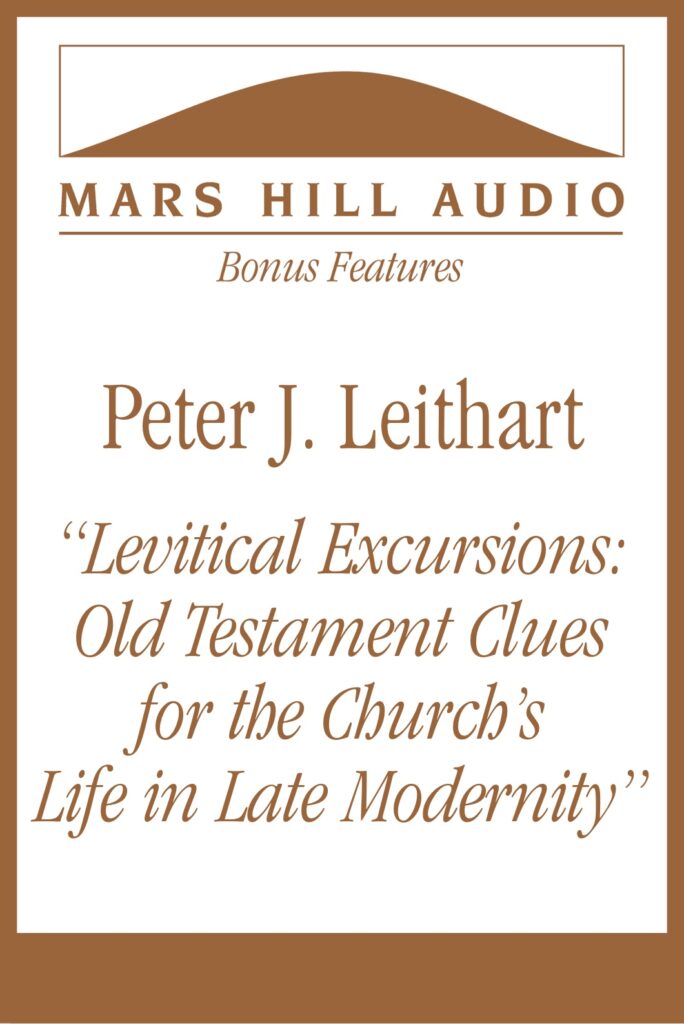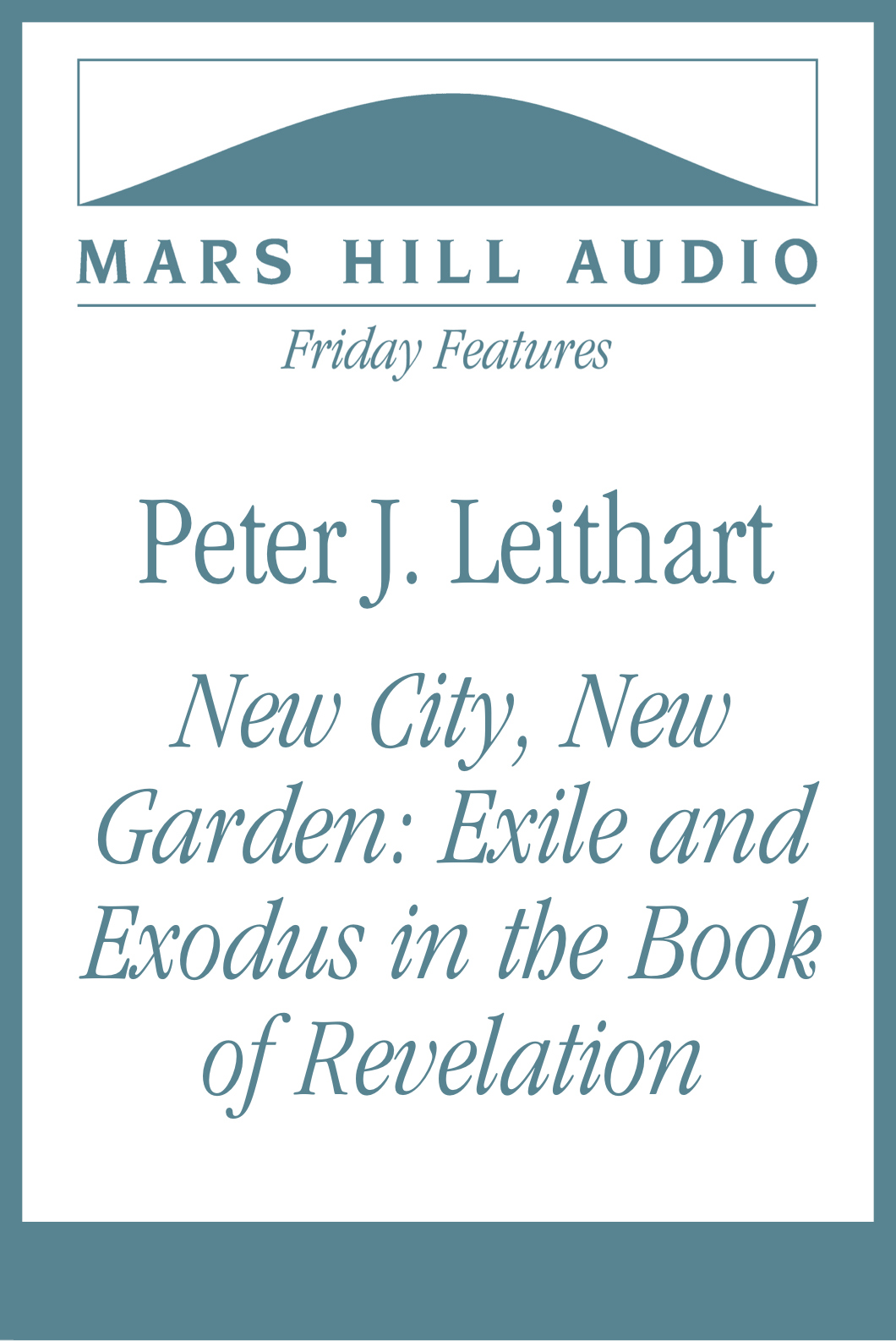released 3/27/2024
In a lecture from 2019 titled “Levitical Excursions: Old Testament Clues for the Church’s Life in Late Modernity,” Peter J. Leithart argues that the Old Testament book of Leviticus may offer surprisingly relevant insights into our late modern culture. In Leviticus may be found clues to the pathologies of our age and to helping us form a “counter-polity” that harmonizes the old and the new. Modernity, Leithart shows, is a “deviant harmony” of the old and the new that leads not to wholeness and life but to reductionism and death. This is most evidenced as we examine the Levitical themes of sacrifice and purity, which find their ultimate fulfillment in Christ. Leithart illustrates how these themes are disordered in modernity, resulting in post-Christian “taboos” and utopian political dreams of purity.
This lecture was originally presented at the 2019 Methexis Institute Conference, “Church & Academy: Deepening Our Dialogue.” It is featured here by permission.
22 minutes
PREVIEW
The player for the full version of this Feature is only available to current members. If you have an active membership, log in here. If you’d like to become a member — with access to all our audio programs — sign up here.
More to hear . . .
In 2017, when in Virginia to give an Areopagus Lecture for Mars Hill Audio, theologian Peter J. Leithart presented an additional lecture at the Center for Christian Study in Charlottesville. That talk was titled “New City, New Garden: Exile and Exodus in the Book of Revelation.” The often perplexing final book of the Bible addresses themes that might seem especially timely today, including the challenge of faithfulness and the meaning of martyrdom. Leithart’s lecture on Revelation is presented courtesy of the Center for Christian Study (University of Virginia).
This feature is available to listeners with a Mars Hill Audio membership.
Related reading and listening
- The recovery of an integrated ecology — In this essay, Michael Hanby unpacks the summons of Laudato si’ to an ecological way of life based on a proper understanding of creation in its fullness and integrity. (57 minutes)
- Speaking the word in love — In this lecture, D. C. Schindler examines core insights from Ferdinand Ulrich on the central vocation of man and the meaning of being. (32 minutes)
- A poet’s relationship to time — FROM VOL. 57 Poet Wilmer Mills (1969–2011) discusses how his agricultural and cross-cultural childhood in Brazil shaped his imagination and his relationship with modernity. (11 minutes)
- Dickinson and modern malaise — FROM VOL. 36 Roger Lundin explains how Emily Dickinson’s understanding of love, nature, religion, and mortality are modern in content. (11 minutes)
- Modernity and the shaping of America — FROM VOL. 48 Historian Jon Butler explains how aspects of modernity were already present and at work in colonial American life prior to 1776. (12 minutes)
- Music, silence, and the order of Creation — In this lecture, Ken Myers explains how it is that our participation in harmonic beauty in music is a kind of participation in the life of God, in Whom all order and beauty coheres and is sustained. (61 minutes)
- The gift of liturgical time — In this lecture, Gregory Wilbur explains how liturgy and liturgical time align us to the rhythms and order of Creation, forming us as disciples. (45 minutes)
- Seasons and everyday saints — Sylvie Vanhoozer introduces a French Advent tradition that involves a community of “little saints” whose stories have something to teach us about following Christ throughout the year. (28 minutes)
- Critiquing “empire criticism” — Allan Bevere and Peter Leithart evaluate “empire criticism,” a way of reading the New Testament with an anti-imperial focus. (36 minutes)
- Mars Hill Audio Journal, Volume 163 — FEATURED GUESTS: Andrew Youngblood, R. J. Snell, Nicholas Denysenko, Nigel Biggar, Robert McNamara, and David Cayley
- The confident optimism in true Christian asceticism — Philosopher Étienne Gilson on the essential goodness of Creation
- Science’s need for philosophy and revelation — D. Stephen Long explores a consistent theme in the work of theologian Hans Urs von Balthasar: the relationship between Christianity, modernity, and secularity. (46 minutes)
- Augusto Del Noce’s critique of modernity — FROM VOL. 128 Physicist and mathematician Carlo Lancellotti discusses the life and work of twentieth-century Italian philosopher, Augusto Del Noce. (25 minutes)
- Festivity and the goodness of Creation — Drawing on Josef Pieper’s ideas, Ken Myers explains why the spirit of festivity is the spirit of worship, and that “entertainment” is ultimately an artificial, contrived, and empty effort to achieve festivity. (25 minutes)
- Faith as the pathway to knowledge — Lesslie Newbigin on authority and the Author of all being
- The integration of theoretical and mythic intelligence — FROM VOL. 156 William C. Hackett discusses the relationships between philosophy and theology, and of both to the meaning embedded in myth. (29 minutes)
- Forms as portals to reality — Ken Myers explains the ancient classical and Christian view that music embodies an order and forms that correspond to the whole of created reality, in its transcendence and materiality. (54 minutes)
- A fearful darkness in mind, heart, and spirit — Roberta Bayer draws on the work of George Parkin Grant (1918–1988) to argue that our “culture of death” must be countered with an understanding of reality based in love, redemptive suffering, and a recognition of limitations to individual control. (33 minutes)
- Creation’s goodness and human faithfulness — J. Matthew Bonzo and Michael R. Stevens on Wendell Berry’s understanding of how Creation is a gift with certain givenness
- Farming and our primal vocation — Shawn and Beth Dougherty make a theological case for biomimicry, or fulfilling our original vocation of tending the earth by working according to the nature of Nature. (68 minutes)
- A theology of eating — FROM VOL. 113 Theologian Norman Wirzba examines the relationship between food and faith. (24 minutes)
- Honoring the pigness of pigs — FROM VOL. 137 Popular innovator and speaker on farming practices Joel Salatin talks about the challenges of caring for Creation within an agricultural and food system that pays little attention to the purposes and inclinations of Creation. (25 minutes)
- An account of God’s relatedness to time and space — Colin Gunton on the trinitarian conception of the divine economy in St. Irenaeus
- What does it mean to be a creature? — Canon-theologian Simon Oliver explains how and why the doctrine of Creation is cardinal and must frame all theology. (62 minutes)
- “Reading Lewis with blinders on” — Chris Armstrong explains how C. S. Lewis’s work is grounded deeply in the Christian humanist tradition. (45 minutes)
- Cleansing sea breezes — Thomas C. Oden argues that rather than being conformed to contemporary ideological trends, we should be informed by 2000 years of the Church’s wisdom. And Darrell Amundsen corrects some false claims about the early Church’s views on suicide. (27 minutes)
- Divorcing the spirit of the age — Thomas C. Oden on overcoming the theological faddism of the late twentieth century
- Orienting reason and passions — In an essay titled “The Abolition of Mania” (Modern Age, Spring 2022), Michael Ward applies C. S. Lewis’s insights to the polarization that afflicts modern societies. (16 minutes)
- Creation as beauty and gift — FROM VOL. 67 David Bentley Hart describes how the Christian understanding of Creation as beauty and gift, as the outward expression of the delight the Trinity has in itself, reveals a vision of reality different from the pagan or fatalist vision of reality. (12 minutes)
- The Life was the Light of men — In a lecture from 2018, Ken Myers contrasts the Enlightenment’s understanding of reason with the Christocentric conception of reason. (57 minutes)
- Discerning an alternative modernity — In a lecture from 2019, Simon Oliver presents a summary of the cultural consequences of the comprehensiveness of the work of Christ. (28 minutes)
- A theology of active beauty — In a 2010 lecture, George Marsden examines a few ways in which the distorting effects of Enlightenment rationalism were resisted in the work of Jonathan Edwards. (64 minutes)
- Mars Hill Audio Journal, Volume 161 — FEATURED GUESTS: Andrew Wilson, Kyle Edward Williams, Andrew James Spencer, Landon Loftin, Esther Lightcap Meek, Andrew Davison
- Let saints on Earth in concert sing . . . — In this audio reprint of an article from First Things, Church historian Robert Wilken describes how the lives of virtuous Christians became models for imitation.(46 minutes)
- Understanding the doctrine of participation — FROM VOL. 150Theologian and priest Andrew Davison believes that retrieving the historic doctrine of participation is vital to help Christians escape from the default philosophy of the age. (32 minutes)
- On Earth as it is in Heaven — FROM VOL. 108Hans Boersma — author of Heavenly Participation: The Weaving of a Sacramental Tapestry — explains why Christians should reject the modern separation of Heaven and Earth and recover a “sacramental ontology.” (26 minutes)
- Lilies as analogues for farming — Fred Bahnson on the wisdom of attending to patterns of Creation
- Making peace with the land — Fred Bahnson challenges us to consider how we might honor our created and redeemed relationship with the earth as God’s stewards. (48 minutes)
- Learning to see the world aright — Norman Wirzba on cultivating a Christocentric vision of Creation
- Alice von Hildebrand centennial — Today’s Feature presents a recording of remarks made by Alice von Hildebrand at an event celebrating her 90th birthday, where she spoke of gratitude and the gifts of God in her life. (17 minutes)
- Resituating discussion of “science” and “religion” — Peter Harrison argues that modern Western culture’s partitioning of ‘science’ and ‘religion’ into distinct spheres is a novel categorical conception in history. (58 minutes)
- Mars Hill Audio Journal, Volume 156 — FEATURED GUESTS:
Kimbell Kornu, Paul Tyson, Mark Noll, David Ney, William C. Hackett, and Marian Schwartz
- Sources of wisdom (and of doubt) — Roger Lundin shares what he has appreciated about Mars Hill Audio conversations, and he discusses what makes Christian belief so implausible to non-believers. (32 minutes)
- This world is now my home — Belden Lane describes several approaches to understanding how we experience the sacredness of earthly places and how we learn to see God manifest in His Creation. (48 minutes)
- Breaking out of the immanent frame — Norman Wirzba on the true character of Creation and of our creatureliness
- Living in a meshwork world — Theologian Norma Wirzba believes that Creation is the “material manifestation of God’s love” and that this fundamental teaching affects everything, especially our understanding of the meaning of modern environmental crises and climate change. (17 minutes)
- “Christianity” is gnostic — Peter Leithart on why what the Church is and practices is not a “religion”
- For the beauty of the earth — Dietrich von Hildebrand on how the love of God deepens our love for the beauty found in Creation
- Aspects of our un-Christening — In this Friday Feature — presented courtesy of Biola University — Carlo Lancellotti talks with Aaron Kheriaty about the central ideas in Augusto Del Noce’s writings. (43 minutes)
- In the house of Tom Bombadil — C. R. Wiley explores the mysterious, “allusive” figure of Tom Bombadil in J. R. R. Tolkien’s Lord of the Rings. (17 minutes)

